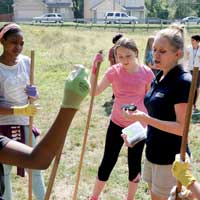Webster Professor Works with Area Sixth-Graders on National Bee Study
August 21, 2017

SAINT LOUIS - Students at Steger Sixth Grade Center in Rock Hill are helping scientists fill in the gaps in research, with the help of Professor Nicole Miller-Struttmann. Struttmann, who holds the Laurance L. Browning, Jr. endowed chair in the Department of Biology, has been working with area students and teachers, to set up scientific equipment and collect data on how bees behave during a solar eclipse.
The project is part of the “Beeclipse,” a national study conducted by several universities during the recent eclipse.
“This isn’t an exercise or a class lesson but rather is an opportunity for these students to do real research that could expand our knowledge of insect behavior,” Miller-Struttmann said. “Think about how cool will it be for these students to contribute to a published scientific article. What a thing to put on their college application!”
According to Miller-Struttmann, the hypothesis for the study is the bees will increasingly become less active until they stop all activity during the period of “totality,” when the sun is completely blocked. Then as the moon’s shadow recedes, the sound from bees will gradually increase until it reaches the level measured before the eclipse, or so the scientists believe.
“While previous studies have been conducted involving bees and eclipses, it’s so rare to have a full eclipse on an entire continent, there hasn’t been much data collected over the years,” Miller-Struttmann said. “In this study, we focus on the sounds of bumble bees, since species within the genus are found throughout the continental United States and our algorithms are trained to recognize their flight buzzes. That way, we have consistent data.”
In the experiment, the students set up microphones throughout the pollinator garden on the Steger campus and recorded the sounds of bees. The recordings started at 11:17 a.m., about one-half hour before the eclipse, so they could capture sounds of how bees normally fly around in the garden regular daylight. The students recorded the bees as the eclipse passed until 3:47 p.m. About every 30 minutes, the students checked each microphone, stated the time and then read out the current weather conditions, so that there would be more data for the scientists to review.
Miller-Struttmann and all the science teachers at Steger met with the students throughout the day the Friday before the eclipse. They taught the children how set up the poles that would hold the recording devices, how to operate the digital recorders, how to operate a weather station and collect data from it, how to photograph bees so that researchers could identify the types of bees living in the area, and how to properly record data throughout the day and submit it for the national study.
The other universities participating in the study are University of Missouri, Columbia; Colorado College, The University of Utah; and Willamette University. Professors from those institutions will record bumblebees in Columbia, Missouri and in various locations in Wyoming, Idaho and Oregon.
The data and sound files collected will be analyzed over the next several months and then submitted to a scientific peer-reviewed journal.
